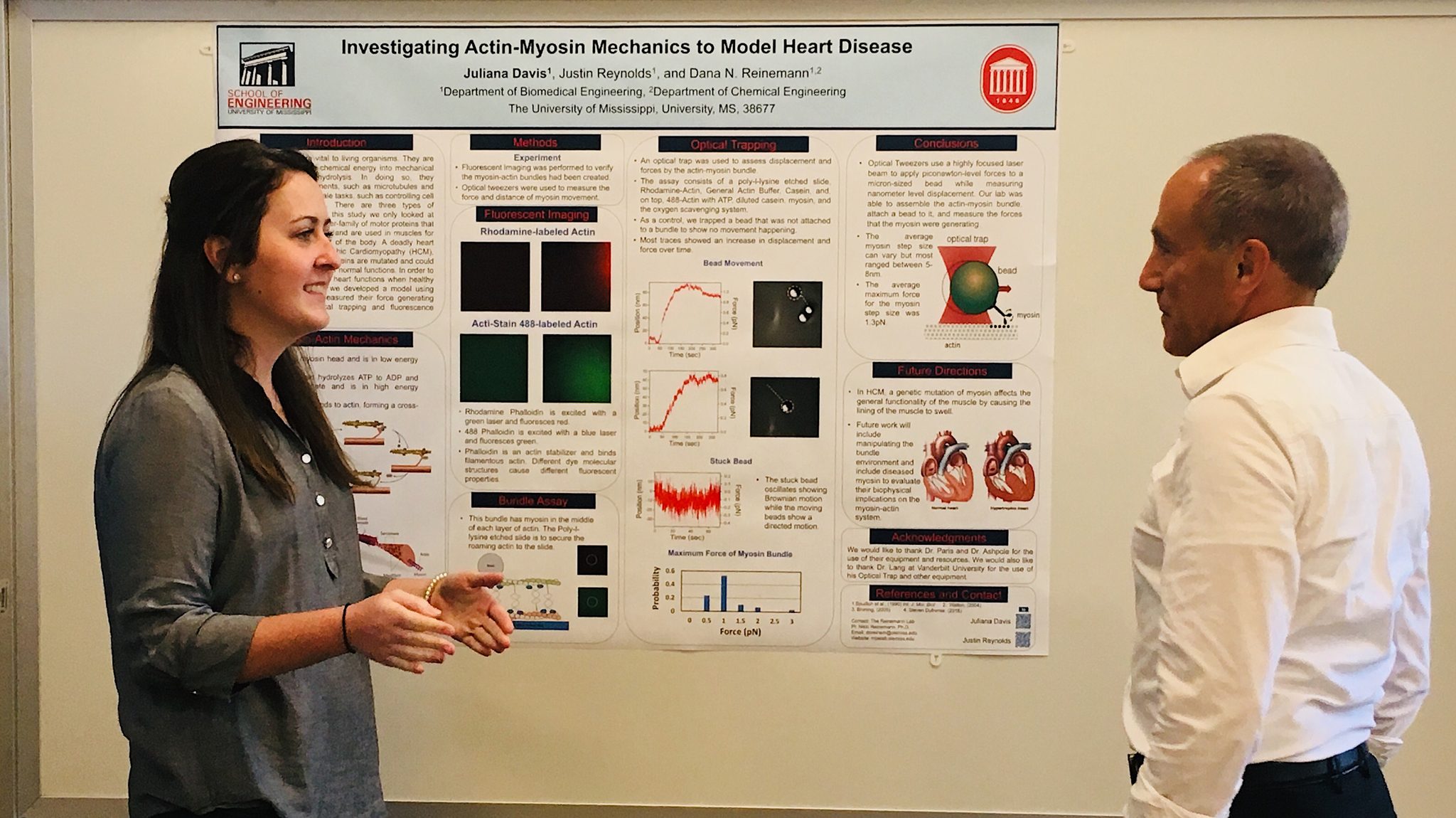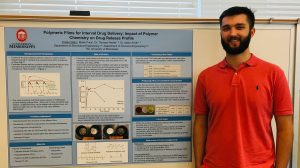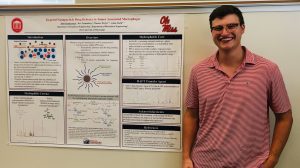
UM senior Juliana Davis, of Olive Branch, explains her nanobiotechnology research to Dave Puleo, dean of the university’s School of Engineering. Davis was among three students participating in the Summer Undergraduate Research Experience in Nanobiotechnology. Submitted photo
OXFORD, Miss. – Three students in the University of Mississippi‘s growing biomedical engineering department spent their summer researching tiny tools that could have huge impacts around the world.
The undergraduate researchers were members of the Summer Undergraduate Research Experience in Nanobiotechnology, a program funded through an internal grant won by a team of Ole Miss biomedical engineering and chemical engineering faculty. The Office of Research and Sponsored Programs funded the pilot program, which provided each student with a competitive stipend, money for their research projects, and enrichment and social activities.
Each project involved the application of nanotechnology – technology involving the manipulation of matter at an atomic or molecular level – to biological research.
The three students are Tristan Daily, of Saltillo, a junior majoring in biomedical engineering; Juliana Davis, of Olive Branch, a senior majoring in biomedical engineering; and John Hendershot, of Franklin, Tennessee, a senior majoring in chemical engineering.

Tristan Daily, a junior from Saltillo majoring in biomedical engineering at UM, shows off his research from the university’s Summer Undergraduate Research Experience in Nanobiotechnology program. Submitted photo
“We were able to recruit exceptionally talented undergraduates to participate and engage in brand new research projects at UM,” said Nikki Reinemann, assistant professor of biomedical engineering and affiliate assistant professor of chemical engineering.
“They rose to the occasion and were able to obtain significant results that will set them up for conference presentations and journal publications, making them more professionally competitive for future careers in research and industry.”
Mentors for the group included Reinemann, who served as program director; Adam Smith, chair and associate professor of chemical engineering, academic director of general engineering and associate professor of biomedical engineering; and Thomas Werfel, assistant professor of biomedical engineering, affiliate assistant professor of chemical engineering and joint assistant professor of biomolecular sciences. Dave Puleo, dean of the School of Engineering and professor of biomedical engineering, also served as a mentor.
Daily worked with Smith in the Polymer Engineering Lab, with guidance from Puleo in developing biomaterials to produce biodegradable films for drug-delivery applications.
Davis has worked with Reinemann in the Molecular Biophysics and Engineering Lab since the fall of 2018. This summer, she investigated vital life processes through engineering and actively assembling cellular components into synthetic nanocells.
Her goal was to build a novel experimental tool to study the mechanics of normal and diseased heart function on the molecular level and subsequently use biophysical methods to unveil those mechanisms.

John Hendershot, a senior from Franklin, Tennessee, who is majoring in chemical engineering at UM, presents his work from the university’s Summer Undergraduate Research Experience in Nanobiotechnology program. Submitted photo
Hendershot was selected based on his winning proposal to the UM Summer Undergraduate Research Experience program for his proposed topic that fits within the nanobiotechnology theme submitted by the faculty team. Hendershot worked with Werfel in the Interdisciplinary NanoBioSciences Lab on developing novel nanomaterials that could be effective in the treatment of certain cancers.
“We had a great first summer,” Werfel said. “We saw a lot of the initial infrastructure for a successful summer research program in the important area of nanobiotechnology come together. Our experiences from this first summer will go towards improving the program.”
Beyond the research, the program also offered weekly seminars from faculty across campus so that students could learn about different fields within nanobiotechnology, as well as research methods, understanding diversity and inclusion in STEM, and professional development, such as resume building.
The program set the foundation for obtaining preliminary data for a planned National Science Foundation Research Experiences for Undergraduates proposal, Reinemann said, with a goal of attracting talented students from across Mississippi and the nation to the department.